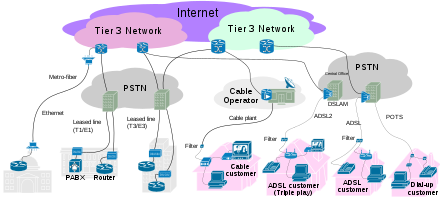Internet service provider
An Internet service provider (ISP) is an organization that provides services accessing and using the Internet. Internet service providers may be organized in various forms, such as commercial, community-owned, non-profit, or otherwise privately owned.
Internet services typically provided by ISPs include Internet access, Internet transit, domain name registration, web hosting, Usenet service and colocation.
Contents
[hide]History[edit]
The Internet was developed as a network between government research laboratories and participating departments of universities. By the late 1980s, a process was set in place towards public, commercial use of the Internet. The remaining restrictions were removed by 1995, 4 years after the introduction of the World Wide Web.[1]
In 1989, the first ISPs were established in Australia[2] and the United States. In Brookline, Massachusetts, The World became the first commercial ISP in the US. Its first customer was served in November 1989.[3]
On 23 April 2014, the U.S. Federal Communications Commission (FCC) was reported to be considering a new rule that will permit ISPs to offer content providers a faster track to send content, thus reversing their earlier net neutrality position.[4][5][6] A possible solution to net neutrality concerns may be municipal broadband, according to Professor Susan Crawford, a legal and technology expert at Harvard Law School.[7] On 15 May 2014, the FCC decided to consider two options regarding Internet services: first, permit fast and slow broadband lanes, thereby compromising net neutrality; and second, reclassify broadband as a telecommunication service, thereby preserving net neutrality.[8][9] On 10 November 2014, President Barack Obamarecommended that the FCC reclassify broadband Internet service as a telecommunications service in order to preserve net neutrality.[10][11][12] On 16 January 2015, Republicans presented legislation, in the form of a U.S. Congress H.R. discussion draft bill, that makes concessions to net neutrality but prohibits the FCC from accomplishing the goal or enacting any further regulation affecting Internet service providers.[13][14] On 31 January 2015, AP News reported that the FCC will present the notion of applying ("with some caveats") Title II (common carrier) of the Communications Act of 1934 to the internet in a vote expected on 26 February 2015.[15][16][17][18][19] Adoption of this notion would reclassify internet service from one of information to one of the telecommunications[20] and, according to Tom Wheeler, chairman of the FCC, ensure net neutrality.[21][22] The FCC is expected to enforce net neutrality in its vote, according to the New York Times.[23][24]
On 26 February 2015, the FCC ruled in favor of net neutrality by adopting Title II (common carrier) of the Communications Act of 1934 and Section 706 in the Telecommunications Act of 1996 to the Internet.[25][26][27] The FCC Chairman, Tom Wheeler, commented, "This is no more a plan to regulate the Internet than the First Amendment is a plan to regulate free speech. They both stand for the same concept."[28] On 12 March 2015, the FCC released the specific details of the net neutrality rules.[29][30][31] On 13 April 2015, the FCC published the final rule on its new "Net Neutrality" regulations.[32][33] These rules went into effect on 12 June 2015.[34]


No comments:
Write comments